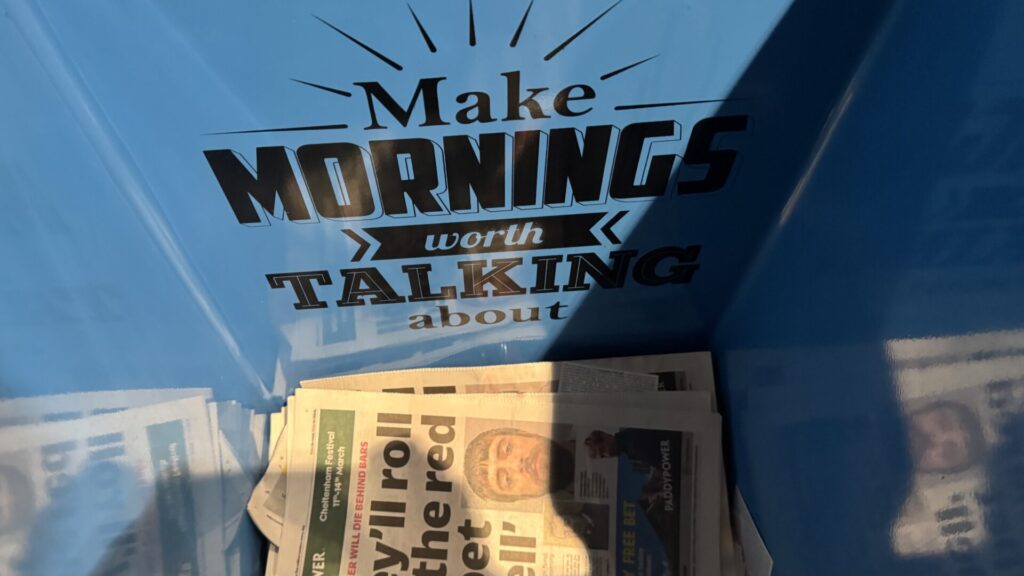
There’s always news. Arguably, everything is news all the time. Right now, it feels like the world is changing by the second because some people in the news are pretty loud, and everybody has an opinion. Should I check my phone for the ‘breaking news’ alert?
Back in 2013, in response to an online discussion, I opined that the generally accepted definition of news was changing from something an editor in a far-off city decided and placed in a newspaper, radio or television bulletin for us to consume to something each of us curates for ourselves using tools the internet has made readily available. I asked,
If I’ve opted to prioritise Formula 1 news or tech stories from Silicon Valley over today’s political posturing over the ECHR (which is front page on the newspaper next to me) then I’ve made a decision that’s no different from the editor that decided to pop that story in the paper. Isn’t Facebook’s timeline just news from my ‘community’ (which is what the news was for most people prior to rise of the mass national press in the late 1700s)? // source
I stand by what I wrote more than ten years ago. I still don’t know why the – relatively recent (in human terms) – phenomenon of an editor is more important than our community. But, in recent years, I have found myself avoiding news altogether: both the views from far-off editors and my curated view. This is where I may concede that social media, as a news service, might be to blame.
The other day, I read How Much Do I Really Need to Know? and it really resonated with me. The news is exhausting. Not just a bit soul-destroying but draining.
When I was younger, the news came on television after The Magic Roundabout at about 5:40 p.m. It lasted twenty minutes on BBC1. John Craven had told me about the world on Newsround an hour earlier, but that was for little kids. There was a lunchtime bulletin, and, of course, adults could watch the Nine O’Clock News. Somewhere in the mix were Look North West and Nationwide. A little later, a revamped Six O’Clock News was launched with snazzy computer graphics, where Nicholas Witchell would end up sitting on some lesbians protesting Section 28, but the new time didn’t give us more news; it was so that we could have Neighbours and then Wogan or EastEnders.
The news was contained; you knew when you’d get told what had happened today, and that’s how it was digested. You waited, and a well-spoken newsreader, who most of the time wasn’t sitting on a protestor, told you what had taken place during the day and provided a little analysis. There wasn’t a studio argument on every topic, and if you missed it, then you waited until the next scheduled bulletin or turned on the radio for the three-minute catch-up.
American radio has had all-news radio almost since the medium’s invention. According to Wikipedia, 1010 WINS is the oldest continuously operating all-news station in the United States, reporting to New York since 1965. In the UK, LBC, the country’s first legal, commercial radio station, was news-based from its opening words in 1973, but the news talk format included many phone-ins. Those early years didn’t quite count.
But then came CNN, and the concept of rolling news arrived worldwide. When I started work, I was often on shift through the night. I used CNN and Sky News as company while alone in the building. Overnight, Sky News had half an hour of locally produced content and, from half-past, thirty minutes of something from America, usually CBS News. It was on all night. So much of it was prerecorded that, come morning, I pretty much knew the overnight scripts off by heart. Not quite continually breaking stories.
Of course, we’d had all-night election coverage for a few years, but my first true appreciation of rolling news was during the first Gulf War. Radio 4 adopted an all-news format, and Radio 1 ran with the line, “When news breaks out, we break in”. It was exciting. On 31 August 1997, I was up very late trying to write copy for some web pages when the programme I had on in the background was interrupted to say that Diana, Princess of Wales, had been injured in a car crash in Paris. It was a late Saturday night, and gradually the channels moved to rolling news. That signalled it was an important story. I flicked between Sky News, CNN, BBC 1, ITV and whatever else was available on the analogue Sky satellite service. But I didn’t stay awake all night, and the news was more sombre in the morning.
Rolling news seemed groundbreaking, exciting, and futuristic. It did not yet seem vapid, vacuous, and bland. We hadn’t yet noticed that the airtime was filled with speculative nonsense. It more or less stayed this way for twenty years until the internet became a source of news, and every publication started to compete to be the first to tell you something. And, when mobile social media was added, everybody was a reporter—or at least had an opinion—and they shared it continually via a device that we all carry with us constantly.
Now, news is information and entertainment combined. Its immediacy is more important than accuracy. A hot take is pushed out simply for attention or to score political or culture-war points on any and every topic. News outlets need your attention and click-bait you into scrolling.
I want to stay informed but don’t want to give my days over to the endless vibration of not-news. What we all need is an informed summary presented calmly, preferably by somebody like Sue Lawley, while Nicholas Witchell subdues a studio invasion. Then we can get on with the rest of our day.
 Like everybody else, I was shocked to hear of the loss of the space shuttle Columbia. Like many, the first pictures I saw were the trails in the sky as the craft disintegrated. I’ve just found
Like everybody else, I was shocked to hear of the loss of the space shuttle Columbia. Like many, the first pictures I saw were the trails in the sky as the craft disintegrated. I’ve just found